News and events
The CERC Newsletter (formerly CERG) is distributed three times per year to subscribers via email. You can view our previous issues below:
September 2025
CERC Newsletter - September 2025 (PDF, 9.6MB)
April 2025
CERC Newsletter - April 2025 (PDF, 15.2MB)
December 2024
CERC Newsletter - December 2024 (PDF, 8.5MB)
July 2024
CERC Newsletter - July 2024 (PDF, 7.1MB)
March 2024
CERC Newsletter - March 2024 (PDF, 6.2MB)
December 2023
CERC Newsletter - December 2023 (PDF, 30.18MB)
July 2023
CERG Newsletter - July 2023 (PDF, 5.3MB)
January 2023
CERG Newsletter - January 2023 (PDF, 2MB)
September 2022
CERG Newsletter - September 2022 (PDF, 493KB)
June 2022
CERG Newsletter - June 2022 (PDF, 527 KB)
March 2022
CERG Newsletter - March 2022 (PDF, 705KB)
December 2021
CERG Newsletter - December 2021 (PDF, 1,290KB)
September 2021
CERG Newsletter - September 2021 (PDF, 405KB)
July 2021
CERG Newsletter - July 2021 (PDF, 453KB)
June 2021
CERG Newsletter - June 2021 (PDF, 1,213KB)
May 2021
CERG Newsletter - May 2021 (PDF, 39,392KB)
February 2021
CERG Newsletter - February 2021 (PDF, 292KB)
December 2020
CERG Newsletter - December 2020 (PDF, 4,559KB)
To stay up to date and receive our quarterly newsletter subscribe here.
Co-Pilot Education Session - October 2025 |
|---|
01 December 2025
In October, CERC delivered an online Co-Pilot Education Session for all members, focused on building confidence and capability in using Federation University’s supported Co-Pilot Chat AI tool. The session introduced participants to core features of Co-Pilot, demonstrated how to navigate the platform, and explored practical ways it can enhance academic productivity. This included examples of how Co-Pilot can assist with tasks such as literature reviews, drafting, editing, and streamlining day-to-day research and teaching activities.
The recording of the session can be found here.
Outcomes of SEED Grant 2024 |
|---|
01 December 2025
In June each year, CERC aims to provide members with an opportunity to apply for a seed grant to the value of $5000. The purpose of the seed grant is to stimulate research projects that may enhance early-career researcher’s portfolios, benefit communities we work with and meet the values of CERC.
The seed grants are aimed at early-career researchers. Funds can be used for open-access publication, dissemination, research assistance, data collection and analysis, or the purchase of research-related equipment.
In 2024, the seed grants were awarded to Dr Riki Lindsey, Dr Emma Siesmaa, and Dr Jacob Dye.
CERC recently hosted the 2024 CERC Seed Grant Presentations – Project Outcomes session. The recording can be found here.
- Dr Riki Lindsey
Title: A qualitative exploration of risk and protective factors for mental health in local level AFL umpires
The 2024 Seed funding has supported the completion of a qualitative study exploring how Australian sports officials perceive and experience seeking help for mental health. Semi-structured interviews were conducted with 16 officials (aged 17–54 years; 3–21 years officiating experience) from basketball, soccer, Australian rules football, netball, cricket, and field hockey. Interviews explored experiences of seeking—or choosing not to seek—mental health support, perceived barriers, and facilitators. Transcripts were analysed using reflexive thematic analysis to identify key themes around organisational, interpersonal, and individual influences on help-seeking.
Preliminary findings indicate that, although officials recognise the importance of seeking support for mental health concerns, many encounter organisational structures and processes that hinder or discourage help-seeking. Younger officials, in particular, reported fears that disclosing mental health challenges might negatively impact their selection for high-profile or finals matches. Practical barriers such as time constraints and the cost of accessing professional support were also identified as key barriers to seeking help. At the same time, officials described the positive role of informal support—such as mentors, assessors, and peer conversations—in normalising mental health discussions and encouraging help-seeking within officiating groups. Officials expressed a strong desire for mental health to be discussed more openly across all levels of their organisations, alongside clearer, more visible referral pathways.
These findings suggest that a comprehensive, system-level approach is required to better support officials’ mental health. Findings from this research hope to inform practical strategies for sporting organisations and officiating bodies to strengthen early intervention and ongoing support for officials. With the support of the CERC seed grant, these findings will be presented at the International Society of Sport Psychology World Congress in Hong Kong in December 2025.
- Dr Emma Siesmaa
Title: Injury occurrence and perceptions among recreational mountain bike park users: What are the implications for park operators?
The 2024 CERC Seed funding has supported this study, which was undertaken in three phases: 1) review of 10 years of hospital-treated data; 2) online survey administration of >400 Victorian riders; 3) workshop with key industry stakeholders, to investigate the injury occurrence and impact of injury of Mountain Bike (MTB) park users across Victoria. The study also engaged with industry stakeholders to facilitate the inception of a MTB Park Injury Advisor Group and to gain useful insights into how injury and risk can be managed within parks to enhance safety and grow and retain participants in the sport.
Preliminary findings from the study show a significant increase in injury within the sport over the past 10-years, likely due to the substantial increase in participation, with males aged 35-50 the most at risk of injury. Most injuries were of high severity, often the result of insufficient trail maintenance, which correspondingly related to stakeholder reports that trail maintenance and access to injured riders for adequate patient care/transport being among the biggest barriers to risk mitigation within MTB parks.
This study has prompted the need for ongoing work to be undertaken between researchers and stakeholders to strengthen the industry’s ability to record and report injury, and secure funding sources for ongoing trail maintenance. Addressing these needs will be among the aims from the development of the MTB Park Injury Advisory Group, as well as the other study outcomes, such as the upcoming submission of two papers for publication from the three study phases, and the survey findings having been presented at the Parks and Leisure Conference (VIC/TAS) in May, 2025.
- Dr Jacob Dye
Title: The efficacy of psychological interventions for the psychological impacts of Post Intensive Care Syndrome (PICS); A systematic review
The seed grant supported a systematic review investigating the efficacy of psychological interventions for the psychological impacts of Post Intensive Care Syndrome (PICS) in ICU survivors and their families. The study was pre-registered on PROSPERO (CRD420251131854), ensuring transparency and methodological rigour from the outset. Funding from the grant was used to employ a research assistant, which significantly accelerated the data extraction and risk of bias assessment processes. To date, data extraction and bias assessment have been completed for 10 studies, with 20 more in progress.
The project has gained considerable momentum and visibility, attracting a PhD student who is now co-supervised by CERC members including Professor Joanne Porter and affiliated with the Collaborative Evaluation and Research Centre (CERC). The review has been led by PhD students, with Erin Harcourt and Brittany Wadforth contributing substantially and designated as co–first authors on the planned publication output.
Preliminary findings suggest that psychological interventions such as Cognitive Behavioural Therapy (CBT), Eye Movement Desensitisation and Reprocessing (EMDR), and coping skills training show promise in reducing symptoms of PTSD, anxiety, and depression. Peer-led and family-focused interventions, including programs like ICURESOLVE and NICU support, have demonstrated improvements in mental health outcomes and perceived self-efficacy. Technology-based approaches, including mobile applications and virtual reality CBT, appear feasible and may enhance psychological recovery post-ICU. Structured post-ICU follow-up programs that incorporate psychological education have also shown benefits in improving quality of life and reducing PTSD symptoms. However, evidence for the effectiveness of ICU diaries remains mixed, with variable outcomes in reducing psychological distress among patients and families. Targeted support for parents of preterm infants, such as listening visits and behavioural assessments, has been effective in reducing maternal anxiety and depression.
Professional Development Session: Thematic Analysis Techniques |
|---|
Professor Joanne Porter recently facilitated a Thematic analysis workshop that covered the following topics:
- Discussion about the choice of methods – focus group discussion / individual interviews / semi-structured questions to structured
- Data saturation
- Cleaning and management of transcripts
- Coding
- Developing and naming themes
The workshop included interactive activities and group discussion.
The recording of the session is available here.
Join CERC in developing the Federation Co-op Evaluation plan |
|---|
The Collaborative Evaluation & Research Centre (CERC) is seeking staff input in the development of the Co-op evaluation plan. This evaluation plan will help inform the vision of the evaluation, including the deliverables and measures of success.
We invite staff to join us in the Co-op co-design workshop series that will be delivered across Ballarat, Berwick and Gippsland campuses.
These sessions will run for approximately 90 minutes. Please nominate your chosen location for attendance using the Eventbrite link: Co-design workshop tickets
Room details for in-person sessions will be available soon.
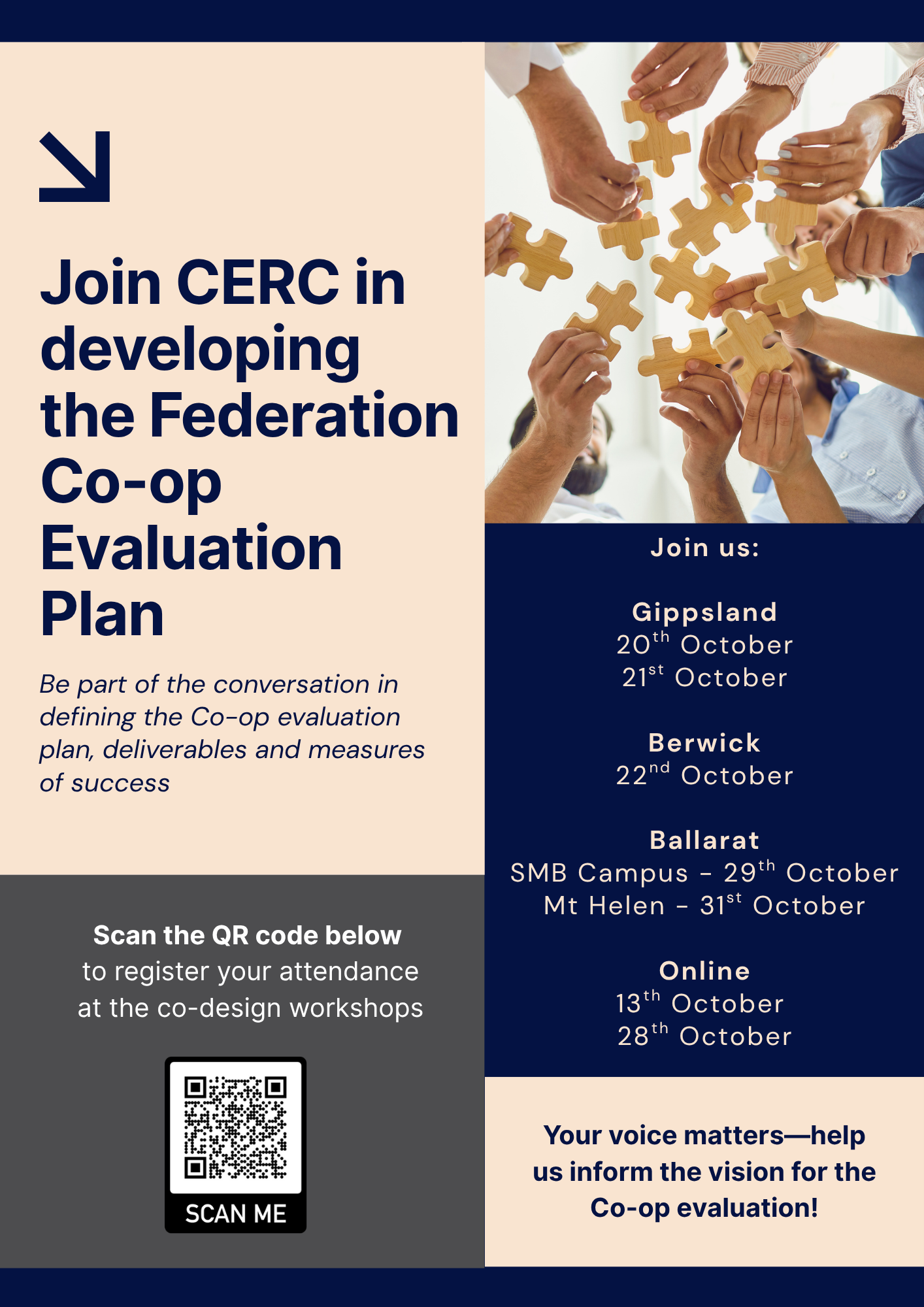
CERC Professional Development Workshop (Friday, 10 October 2025) – Open to All Members |
|---|
The Collaborative Evaluation and Research Centre (CERC) warmly invites all members of our community—including staff and HDR students—to a one-day, on-campus professional development workshop focused on key aspects of research practice and growth.
Location: Berwick Campus, Room BER_901_203
Date: Friday, 10 October 2025
Time: 9:00 AM – 4:00 PM
This workshop is designed to offer valuable insights and practical guidance for researchers at all stages of their academic journey. We hope you’ll find the sessions both engaging and enriching.
👉 Click here to enrol - CERC Professional Development Workshop - Tickets
We look forward to your participation!
Successful SEED Grant applications 2025 |
|---|
05 August 2025
Each year, CERC aims to provide members with an opportunity to apply for a SEED grant to the value of $5000. The purpose of the SEED grant is to stimulate research projects that may enhance early-career researchers' portfolios, benefit communities we work with and meet the values of CERC. The SEED grants were aimed at early-career researchers. Funds could be used for open-access publication, dissemination, research assistance, data collection and analysis, or the purchase of research-related equipment.
In 2025, there was a total of 8 SEED Grant applications from several teams and different disciplines. CERC would like to thank the senior CERC members who assisted with the evaluation and feedback for the applications.
We would also like to commend all members who submitted applications and hope that CERC can continue to support your research into the future.
This year, we are happy to announce four SEED Grants.
The following projects have been awarded the CERC SEED Grants for 2025:
- Dr Divya Peter
Co-Researchers & affiliations: Dr. Robeena Emmanuel and Dr Bindu Joseph - Dr Ria de Gracia
Co-Researchers & affiliations: Dr. Marlies Alvarenga and Prof. Rachel Grieve - Dr Elissa Dabkowski
Co-Researchers & affiliations: Chelsea Webb, A/Prof Loretta Garvey, Amber Van Drevan, Simon Williams - Dr Natalia Albein Urios
Co-Researchers & affiliations: Prof Rachel Grieve & Kaiden Hein (FED) / Dr Melissa Kirkovski (DEAKIN)
Title: Mental Health Awareness and Help-seeking Behaviours in Second Generation Migrants in Australia: A Mixed Method Intervention Study
Title: Evaluating the Impact of the Kurnai Young Parents Program (KYPP): A Qualitative Study
Title: Enhancing Nursing Students’ Capability in Preventing and Responding to Falls, Pressure Injuries, and Medication Errors: A Mixed Methods Evaluation of a Co-Designed Workshop Series
Title: Autism, Impulsivity and Addiction
Leadership and Management Innovations Breakfast Meeting |
|---|
7 November 2024
The Collaborative Evaluation and Research Centre (CERC) will hold a Leadership and Management Innovations Breakfast Meeting on the 26th of November from 7:00 am-9:00 am at the Sovereign Park Motor Inn in Ballarat. This will be a morning of sharing ideas and experiences in adopting inclusive practices in work environments for construction and manufacturing industries. We will be exploring answers to questions: What does leadership mean for your company / industry? What are the benefits of creating a positive work culture? Federation University is working with Federation TAFE and the construction and manufacturing industry partners towards creating leadership practices that will develop a resilient future workforce. Learn from industry leaders, experts, and from each other as we share experiences related to inclusive practices in work environments.
We are inviting everyone who is interested to attend this event. Please register by clicking this link.
Should you have any questions about this event, please contact the Principal Researcher, Professor Joanne Porter at CERC@federation.edu.au.

Community Panel recruitment - Future Land Uses for the Latrobe Valley Mine Lands |
|---|
30 October 2024
Federation University and CSIRO have teamed up on a research project focussed on collaborative planning for future land uses for the Latrobe Valley mine lands (HREC approval 2024/182)
The Latrobe Valley’s three large open cut brown coal mines all plan to close for the purpose of electricity generation. The mine operators are required to rehabilitate the mined land to a safe, stable and sustainable state. During and after this multi-decade process, approximately 10,000 hectares of land around the mine pits and close to major towns, will become available for other uses. We are interested to hear from a broad cross-section of the Latrobe Valley community, represented by a panel of 30 adults who live or work/study in the Latrobe Valley about their aspirations for these sites.
People chosen to be panel members, will be required to attend four Wednesday evening sessions for three hours each in November and early December, 2024. A meal and a $50 gift voucher will be provided for each session. No prior knowledge of the sites is needed as we will provide participants with information on the sites and potential future land uses.
People interested in participating will be required to complete a survey, to ensure we have diverse voices represented in the panel. This should take around 15 minutes to complete.
Please follow the link to apply:
https://federation.syd1.qualtrics.com
For further questions, please contact Assoc. Prof Jess Reeves: j.reeves@federation.edu.au 5327 9049
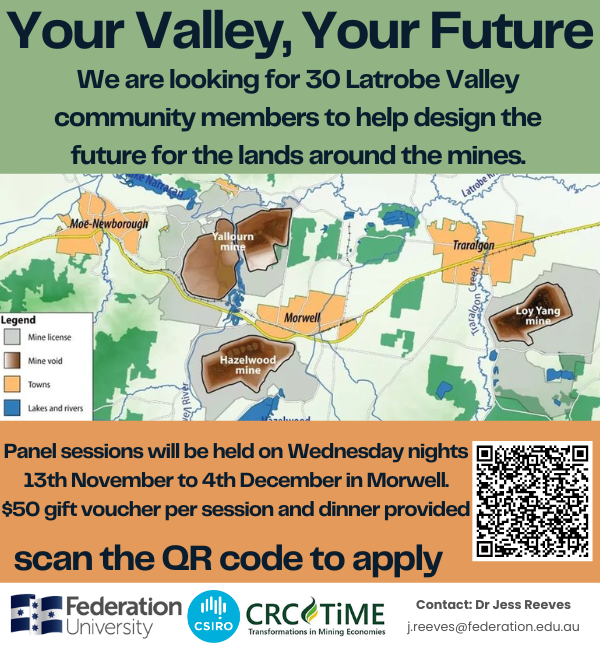
Outcomes of SEED Grant 2023 |
|---|
01 July 2024
In June each year, CERC aims to provide members with an opportunity to apply for a seed grant to the value of $5000. The purpose of the seed grant is to stimulate research projects that may enhance early-career researcher’s portfolios, benefit communities we work with and meet the values of CERC.
The seed grants are aimed at early-career researchers. Funds can be used for open-access publication, dissemination, research assistance, data collection and analysis, or the purchase of research-related equipment.
In 2023, the seed grants were awarded to Dr Bindu Joseph and Robeena Emmanuel and Dr Samuel Zhang.
Dr. Bindu Joseph and Mrs. Robeena Emmanuel used grant money to run Mental health awareness programs for carers and parents of young people from Culturally and Linguistically Diverse Background in Australia. This research aims to improve mental health awareness and help seeking behaviour through an education intervention. Four education sessions were conducted with total of 332 participants in Southeast and regional Victoria.
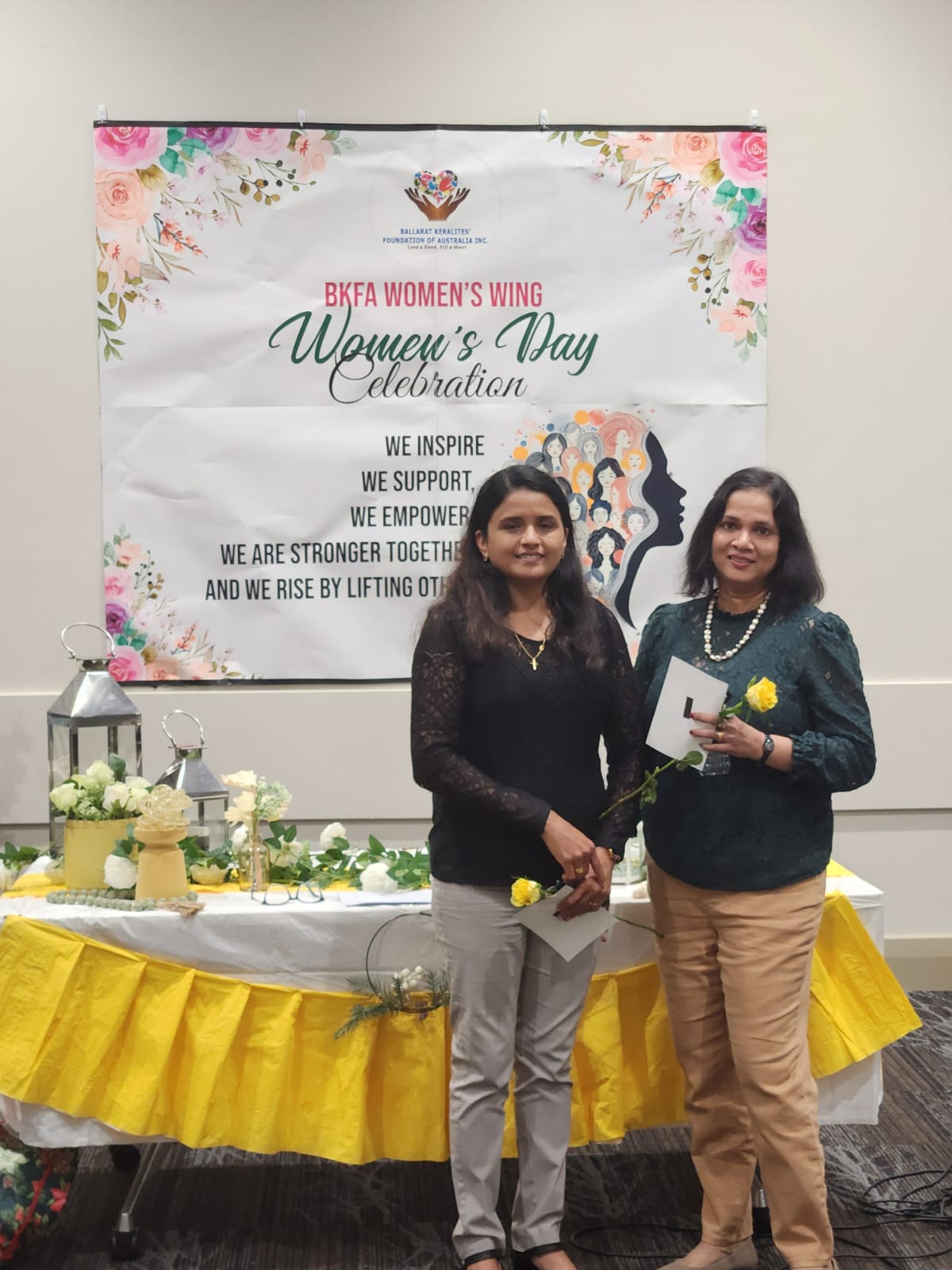
Dr. Joseph and Mrs. Emmanuel at one of their education sessions
CERC 2023 Seed Grant winner Dr Samuel Zhang used the grant to boost his research projects.
One research project investigated the effect of entrepreneurship on subjective wellbeing. Samuel and his co-authors found that being an entrepreneur increases subjective wellbeing and that this effect is stronger among males and rural residents. This study has been published in the Top 10% prestigious journal – Journal of Business Venturing Insight. Another project looked at the impact of communicable disease epidemics on healthcare worker (HCW) corruption, focusing on Nigeria's recent Lassa fever outbreak. Samuel has presented this study at the 14th Australian Public Choice Conference and received constructive feedback. Samuel also utilised the seed grant to develop his technical skills for future research projects.
Koomson, I., Zhang, Q., Prakash, K. (2024). Entrepreneurship and subjective wellbeing in China:Exploring linkages and potential channels. Journal of Business Venturing Insights, 21, e00449. https://doi.org/10.1016/j.jbvi.2024.e00449
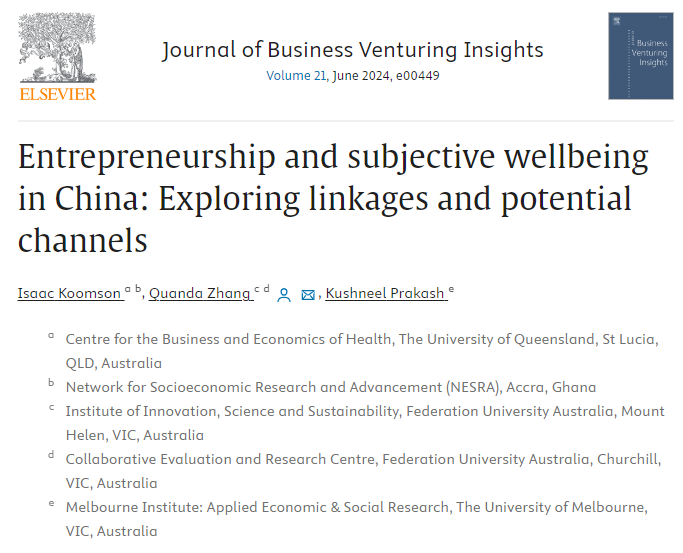
Dr Zhang's article supported by the CERC Seed Grant
Successful SEED Grant applications |
|---|
03 June 2024
Each year, CERC aims to provide members with an opportunity to apply for a SEED grant to the value of $5000. The purpose of the SEED grant is to stimulate research projects that may enhance early-career researchers' portfolios, benefit communities we work with and meet the values of CERC. The SEED grants were aimed at early-career researchers. Funds could be used for open-access publication, dissemination, research assistance, data collection and analysis, or the purchase of research-related equipment.
In 2024, there was a total of 10 SEED Grant applications, from several teams and different disciplines. CERC would like to thank the senior CERC members who assisted with the evaluation and feedback for the applications.
We would also like to commend all members who submitted applications and hope that CERC can continue to support your research into the future.
This year we are happy to announce four SEED Grants.
The following projects have been awarded the CERC SEED Grants for 2024:
- Dr Riki Lindsey, Dr Dominic McNeil
Title: A qualitative exploration of risk and protective factors for mental health in local level AFL umpires
Qualitative study- Project aim is to identify key protective and risk factors for MH in local level AFL umpires.
- Dr Emma Siesmaa, Dr Ryan Worn, Megan Hekkema Dr Meghan Casey
Title: Injury occurrence and perceptions among recreational mountain bike park users: What are the implications for park operators?
Quantitative methods – Project aim is to quantify injury incidence among recreational mountain biking and understand the impacts of injury occurrence to those engaging with mountain bike parks.
- Jacob Dye, Megan Youngson, Megan Jenkins, Dixie Statham, George Van Doorn,
Nanette Gerlach, Gabriel Tillman, Erin Harcourt
Title: The efficacy of psychological interventions for the psychological impacts of Post Intensive Care Syndrome (PICS); A systematic review
Systematic review – Project aims to better understand the factors that influence PICS psychological outcomes, the current state of knowledge for PICS psychological interventions, and the efficacy of implementing a preventative psychological intervention to reduce the incidence of PICS symptoms.
- Dr K. Hood, Professor Michael Olasoji, Trent Kooyman, Angela Gaylard, Hayley Morgan
Title: Interprofessional Student Team Placements: Collaborating for person-centred care for people living with homelessness: A Pilot Project.
Mixed Methods design- Project aims to evaluate the outcomes of a novel placement model in which interprofessional student teams collaborate in the care and support of people living with homelessness.
Rainbow Brick Road report shines spotlight on LGBTQIA+ experiences |
|---|
17 May 2023
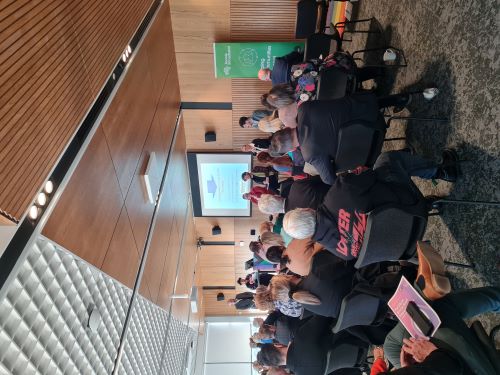
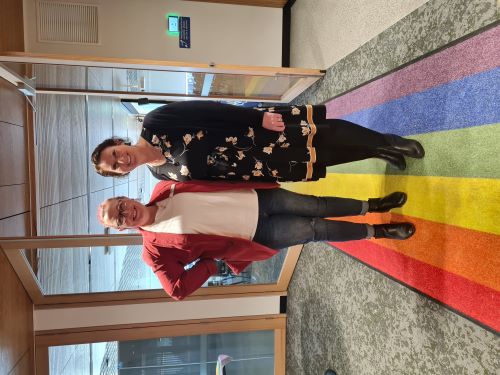
A timely report looking at the lived experiences of the LGBTQIA+ community across Gippsland has recommended an increase to mental health services, inclusivity training in health settings and educational institutions, and development of a support network, among other initiatives.
The Gippsland Rainbow Brick Road project was created by the Gippsland Pride Initiative, who developed a community survey and ran a series of professional development workshops across all six shires of Gippsland on LGBTQIA+ inclusivity and experience.
Data collected from the surveys and workshops was analysed by Federation University’s Collaborative Evaluation and Research Group.
The survey looked at the areas of workplace, family, education, healthcare services, community groups and sporting clubs. Its findings include:
- While 58% of participants had not experienced harassment in the workplace, almost half had heard negative or offensive statements or been exposed to subtle forms of harassment in the workplace.
- More than 67% of participants had concerns or serious concerns for their mental health and 45% were not able to access
mental health support in their immediate location. - Alarmingly, more than 70% of respondents had considered self-harm or suicide in their lifetime, only half feeling that their concerns were treated seriously.
- Respondents said education and time were key to gaining understanding and support from family and friends.
- At school, 45% felt they were not supported to be their whole selves, however, a positive generational change had been seen by many participants.
- More than half the participants did not believe there were enough safe and accessible spaces for LGBTQIA+ people in their community. However, the majority felt supported by community groups they were involved with to be their whole self, and that gender and
sexuality were not barriers to participation. - Those participants involved with sporting clubs found them to be supportive and actively promoted LGBTQIA+ policies, however, only 30 participants responded that they were actively engaged in sport.
The Gippsland Rainbow Brick Road report was launched earlier today to coincide with the International Day Against Homophobia, Biphobia, Intersex Discrimination and Transphobia (IDAHOBIT).
As next steps, the report also recommended training for health professionals to increase the number of practitioners able to provide evidence-based clinical practice for the LGBTQIA+ community as well as the development of an up-to-date directory of local LGBTQIA+ services.
The full recommendations and summary of findings, will be made available at gippslandprideinitiative.com/
Quote attributable to Federation University’s Collaborative Evaluation Research Group Director, Professor Joanne Porter “The Rainbow Brick Report will help inform real change in the education, health and community services sectors across Gippsland.”
“It was our job to showcase the voices and experiences of the LGBTQIA+ community, in order to provide organisations and agencies with the necessary evidence towards improving services and support in Gippsland.”
Quote attributable to Gippsland Pride Initiative Co-founder, Caitlin Grigsby
“This piece of work is to our knowledge, a first of its kind, region specific assessment of LGBTQIA+ experiences in Australia.”
“It is our hope and intention that this work results in region-specific and community-informed action, to more effectively bridge the gaps and contribute to a fulfilling, equitable and enriching lived experience for LGBTQIA+ Gippslanders.”
Supporting students into careers and further education |
|---|
20 December 2022
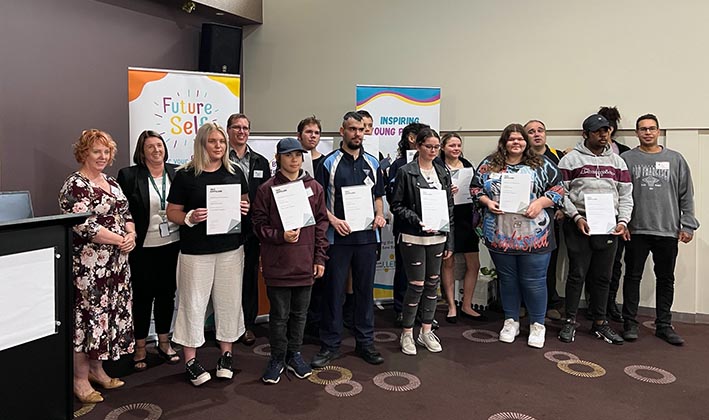
A pilot program that helps young Aboriginal and Torres Strait Islander peoples get the skills to find employment or progress to further education and training should be expanded and rolled out beyond the Gippsland region, a Federation University researcher says. The program, called I Am Deadly, was offered by the Baw Baw and Latrobe Local Learning and Employment Network, and researchers from Federation's Collaborative Evaluation and Research Group have been working to evaluate its impact.
CERG director Professor Joanne Porter says the program was designed to bring the year 10-12 students together and to deliver a program in a culturally sensitive and appropriate way, supporting the teenagers to learn in a different format outside of the secondary school system. "Part of the success of this project can be seen by the fact that some of the students were struggling to remain engaged with school, but they were happy to go to Youth Space in Morwell once a week for the I am Deadly program," Associate Professor Porter said. "The group were engaged with hands-on activities, giving it a go with a variety of different trades and occupations. Perhaps the most significant finding from this project was the development of the students' career aspirations, with many going on to get part-time employment.
"The change in their confidence from week one to the end of the program has been enormous. Being able to make eye contact and to find their voice – these are kids that were lost in the public school system, and this program enabled them to have an opportunity to really learn in an environment that gave them voice."They genuinely enjoyed the opportunity to come out of their regular school for that one day a week into a different learning environment and into a very applied learning setting. It's hands-on, very conversational with discussions and debate, and that's a different learning platform. "Then to go on and have a work experience component gave them an opportunity to go into the workplace and learn what it was like."
Professor Porter says the program helped the students develop their communication and practical skills, like approaching a job interview. "Much of the training was activity-based which involved working in teams and learning to listen to the other team members. And there were simple tasks like building straw towers as high as possible and blindfold exercises – these are great team-building exercises where you learn to trust one another," she said. "The program includes all the elements essential to being in the workplace, including the teamwork, leadership and communication skills,
and the way technology fits into their futures."
The CERG team's role included speaking with the students and the program's facilitators at different stages during the program. "Our job is to showcase what everyone's learnt along the way. That means we're interviewing the representatives from TAFE and industries that volunteer to have the students, as well as the students themselves and what it's meant to them," Professor Porter said. "Of the key findings, it was recognised that a much longer program, beyond the one-year I Am Deadly program, is needed to consolidate the learnings of the program and support them into the future."
"If we're going to really support Indigenous students through to higher learning, whether TAFE or tertiary settings, we need to have a three to five-year mechanism. This program is an important first step, but the students need ongoing support, and we've seen how this can really help with
the Aboriginal Education Centre at Federation which supports our Indigenous students. "How great would it be if this was rolled out to all year 10 Indigenous students right across the nation? It would make a big difference to keep the students engaged with education and provide supported career pathways."
Launch of the Latrobe Valley Authority (LVA) Career Pathways Project |
|---|
20 April 2022
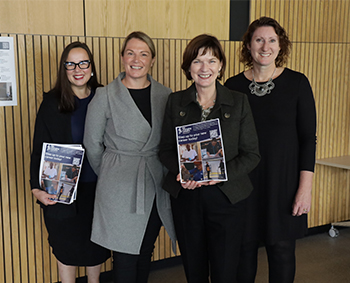
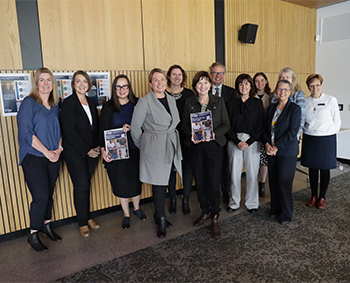
Mary-Anne Thomas MP and Harriet Shing MP officially launched the Career Pathways Project on the 20th of April, 2022. Funded by the Latrobe Valley Authority (LVA), the project focused on exploring the stories of local individuals, recording their experiences and mapping their career journeys to highlight pathways into the Health and Community Services sector in Gippsland. The project resulted in the creation of 10 videos and two booklets which were launched at the event, and which will be used by a network of industry partners to highlight the career pathway options available to individuals seeking a career in Health and Community Services.
Find out more about this project and watch our Gippsland career pathway stories
CERG launch at Morwell Innovation Centre |
|---|
21 February 2022
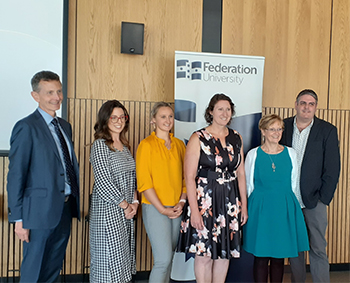
Established in 2018, the Collaborative Evaluation Unit (CEU) has become the preferred evaluation provider in the Gippsland region and has been instrumental in evaluating innovative community projects.
On Monday 21 February, the CEU was relaunched as the Collaborative Evaluation Research Group (CERG) at Federation University’s Morwell Innovation Centre in the Gippsland region.
CERG will work in partnership with all schools and the Health Innovation Translation Centre. The Research Group will continue to facilitate the development of long-term, innovative, multidisciplinary solutions for governments and the community in Victoria and beyond.
Contact
To engage CERC's evaluation services, collaborate with us or ask about our research, please get in touch via the Contact page.